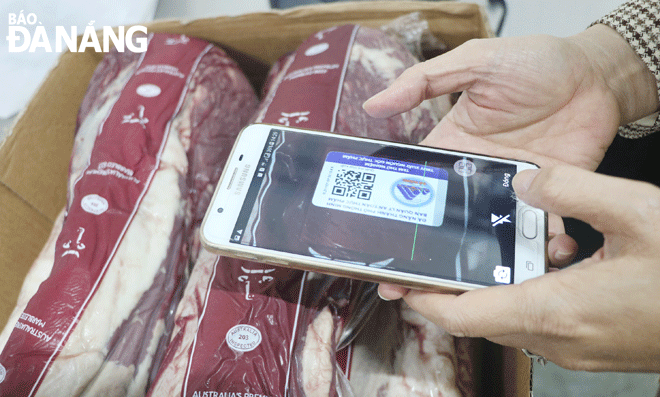Da Nang steps up digital transformation in food traceability
At the end of October 2021, the Da Nang Food Safety Management Board implemented the first phase of the ‘Food traceability’ project, which plays an important basis for ensuring transparent information on production processes to build up strong customer trust in tandem with increasing the value of products.
 |
| Shoppers scan the QR codes to trace down the origin of the products on sale at the Da Nang branch of the Ngon Classic Co., Ltd., in Tho Quang Ward, Son Tra District. Photo: VAN HOANG |
The first phase of the ‘Food traceability’ project, is being implemented at a total cost of nearly VND4,923 billion funded by the municipal budget.
Under the project, focus is placed on building a database and web/app with in-depth traceability for the meat and egg product chain, enhancing food safety management capacity and investing in equipment in service for traceability.
Promoting the IT application
According to the Da Nang Food Safety Management Board, under the Phase 1 of the aforementioned project, functional forces are in charge of implementing food traceability via the use of QR codes labelled on pork and beef products at a number of local establishments.
Up to now, four pork and beef supply chains have been traced down. For pork and beef products raised in the city, information retrieval is done from farms to consumers. In case the meat is sourced from other provinces and cities nationwide, it can be traced starting from the slaughterhouse. Meanwhile, meat imported from abroad is traceable from importers based in Viet Nam to units and businesses in Da Nang and to consumers.
The attachment of QR codes to products on sale has been implemented at a total of about 1,500 food production and business establishments, and restaurants across the city.
Heading towards building Da Nang into a venue of safe food
Improving traceability will make consumers feel safe using products with clear origin and guaranteed quality. It will also prevent commercial frauds and improve the brand value of Vietnamese products.
According to the municipal Food Safety Management Board, in order for the implementation of food traceability to be highly effective, close coordination amongst State management agencies, food production, processing and trading units and consumers is highly required in ensuring food safety.
State agencies are entitled to receive feedback from consumer on products, conduct more surprise inspections and make updates on monitoring missions.
Meanwhile, food production, processing and trading establishments are supported to build up a data warehouse, proactively declare basic information and make updates on input and output products.
Consumers are highly recommended to join processes of evaluating food quality and even report incidents of food safety risk through smart-phone applications, thus contributing to the growth of safe and quality food products as well as ‘boycotting’ and removing dirty and poor-quality food from the food consumer market.
According to Mr. Nguyen Tan Hai, Head of the municipal Food Safety Management Board, digital transformation in food safety assurance, especially in food traceability, is associated with the city’s digital transformation strategies. This is an inevitable trend when all economic and social activities are strongly transformed on the digital platform in the present time.
Since 2018, the municipal Food Safety Management Board has carried out digital transformation in its activities.
The ‘Food traceability’ project has a long-term orientation to build Da Nang into a venue of safe food imbued with the people-centered spirit and ensuring transparent information in food-related matters.
In the time ahead, the city is planned to deploy the next phases of the smart food traceability project on other food chains.
Reporting by VAN HOANG – Translated by A.THU